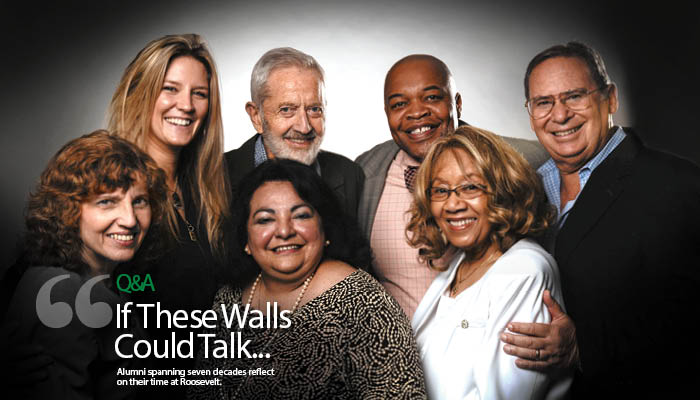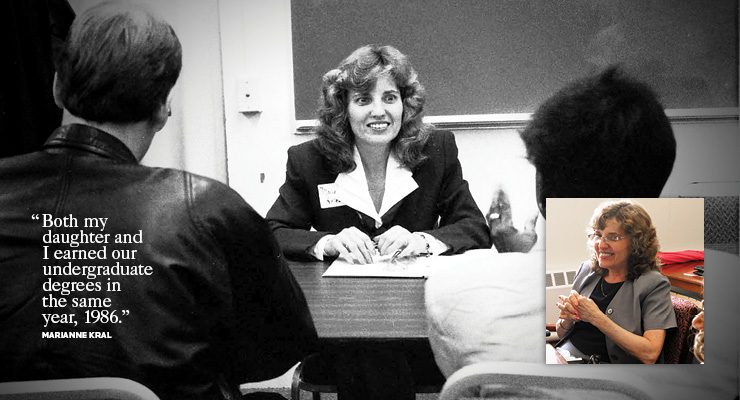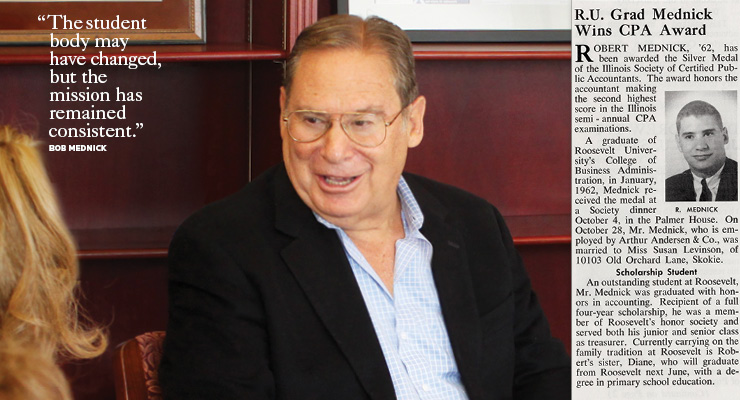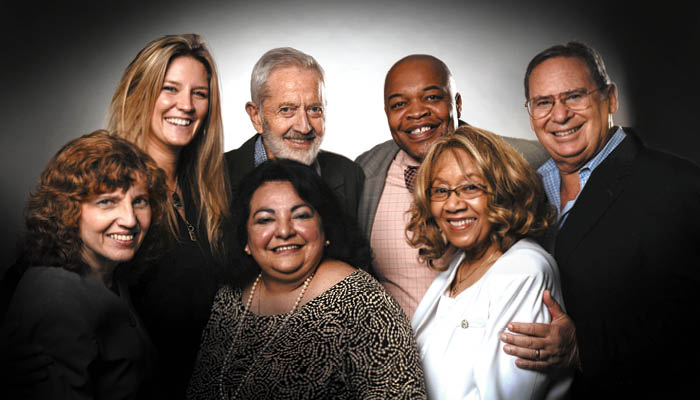
On April 17, 2015, Roosevelt University will be 70 years old. Since its historic founding near the end of World War II, Roosevelt has grown from a small college with no accreditation, no endowment and no library into a comprehensive University with 6,100 students, six colleges and 85,000 alumni.
To learn what Roosevelt was like during the past 70 years, Roosevelt Review invited seven alumni, one from each decade, to share their recollections and observations during a roundtable discussion with Review Editor Tom Karow. For 1.5 hours, they told stories about what the University was like when they were students. Although each attended the University in a different era, they had much in common as the conversation kept returning to Roosevelt’s inclusive mission, its commitment to students and how the University met their educational and personal needs.
Following are excerpts from the conversation.
Tom Karow: Why did you decide to attend Roosevelt? What was it that appealed to you?
Bob Mednick: I decided at the age of 17 that I wanted to be a CPA. Roosevelt had a very fine accounting department that was really known around the country, so for me it was an easy decision. I actually applied to Dartmouth College and got a small scholarship, but there was no way I could have lived within my means and gone there. I’m a first generation college student and received scholarships from two African-American-owned companies to attend Roosevelt during my first two years.
Sami Grisafe: I’m from California and wanted to go to a theater-intensive school that was conservatory-based so I auditioned in Lincoln, Neb., for 50 schools all across the nation. I received callbacks and scholarship offers from eight schools, some of them pretty big. However, Roosevelt was the only school that allowed you to work in theater professionally while enrolled so I applied and luckily got in.
Frances Carroll: When I was at DuSable High School, a Roosevelt counselor visited and my twin sister and I took an admission test. We passed and were admitted, but didn’t receive a scholarship so we attended another college, which we found to be racist. Our mother reminded us that Roosevelt said we could apply anytime, so we took our admission letters to Roosevelt where we were immediately accepted. It’s really great when the school has integrity and does what it said it would.
Erwin Acox: I transferred from Western Illinois in 1994. It was a good school, but I had too much fun. Once I came to Roosevelt, I knew I was in the right place and wish I had started here. Although I was on probation when I began, I finished strong, earning my bachelor’s degree in psychology and then going on to earn two master’s degrees from Roosevelt.
Marianne Kral: I was working full time and had two kids when I decided to go back to school. My statistics teacher at Harper College suggested I apply for a scholarship to Roosevelt, which was close to home and new in the northwest suburbs at the time. Ironically, both my daughter and I earned our undergraduate degrees in the same year, 1986.

Like many Roosevelt alumni, Kral received both her bachelor’s and master’s degrees from the University.
Karow: For many Roosevelt alumni, there are one or two professors whom they remember well for their teaching, mentoring or other activities. Are there any professors you recall who really stood out?
Carroll: Frances Horwich, founder of the television show Ding Dong School, was my teacher for early childhood classes. She was a wonderful professor and very encouraging. I recall in one class that I mispronounced a word. So I said, “How can I do better?” She replied, “Change your friends, dearie.” Change my friends? Well, she was absolutely right. I had to broaden my friendships so I wasn’t around everyone who spoke like me. In addition, Lorenzo Turner, professor of African Studies, enriched my life. He provided our class with the true history of African people, their contributions to history and the traditions and culture that were infused into the African-American culture.
Grisafe: Acting Professor Kestutis Nakas had me in one of his plays. We went to New York and performed in a club there, which was a really cool experience. He also taught a performance art class that ultimately helped me discover myself. I came out of the closet shortly after that. Roosevelt is very welcoming of all groups of people and I felt very comfortable doing that here. He taught more than your routine theater courses; he was very much an out-of-the-box thinker and that’s helped me transition now from being an actor to a musician.
Mednick: Sam Specthrie was an accounting professor who was very beloved. He was a great teacher who prepared us well to take the three-day CPA exam. About a week before the exam, he could see that our class was nervous, so to help us relax, he told us to attend an open meeting of the Illinois CPA Society. “Go down there and look at the people sitting on the dais. See if that doesn’t give you confidence,” he said. It was a joke, but it was fun and a good thing to do for us.
Dick Ettlinger: I remember Professor (George) Watson, who taught constitutional law and was always about two chapters ahead of us. Our class was small and we had long debates on Supreme Court rulings like Marbury v. Madison. Those things stick in your mind because he was such a wonderful teacher.

2007 alumna Sami Grisafe is a professional singer and a professional football player with the Chicago Force.
Karow: What were some of the advantages of a Roosevelt education when you attended?
Michi Peña: I liked the fact that many of the business professors were working professionals in areas like advertising. It wasn’t just theory, it was a practical experience. I also enjoyed being able to do on-campus interviews. I had an opportunity to interview with Leo Burnett, General Mills and IBM. After Roosevelt, I started my career at IBM and then later went to work for the city of Chicago.
Carroll: The teachers were so helpful; they were like friends. Tuition was $13 a credit hour when I was in school and if you paid in full, you got 50 cents deducted from each hour. We always paid on time, but one semester I think payday at home was after tuition time. Roosevelt gave you a little yellow slip and they would come to your class if you hadn’t paid the tuition. Professor Horowitz said, “Can I see you for a minute, Frances?” I can remember this, it was so touching. She had a yellow slip folded very small and when I came up to her desk, she just said, “Take care of this.” I never will forget that.
Kral: I was able to take all of my undergraduate courses in the northwest suburbs and never had to come downtown. Another important feature of Roosevelt is that the classes were all small; I don’t think I ever had a class that was larger than 30 people. My daughter had to sit in assembly halls with hundreds of students.
Acox: I always appreciated being able to work every semester I was on campus. Administrators and teachers were always referring me to different jobs so I could work while I was taking classes. One of the people I worked for was Professor Marie Kissel who helped develop Roosevelt’s training and development program.
Karow: What do you recall about student life at Roosevelt? How did you participate?
Ettlinger: The big thing was that during the lunch hour people would talk and debate. Some of the faculty and people from outside were right wingers. You also had very liberal people and you had the middle range. But the debates weren’t contentious; they were all citizens first.
Acox: I came in the mid-’90s – the hip-hop era. I would hang out with kids of all different backgrounds and races. I was a DJ on Roosevelt’s radio station and went by the name of “Huggie Bear.” I’m a big fan of disco so I would play that music. I also became vice president of the Student Senate and was a student trustee. It was pretty amazing to be this young, hip-hop kind of guy and then become very active in student government. It was a great time.
Carroll: Student life was absolutely fantastic. There were so many plays and activities that you could participate in. I was a part of the Future Teachers of America Club and I had an opportunity to organize and attend Roosevelt’s first prom.

When she was a student at Roosevelt in the 1950s, Frances Carroll organized Roosevelt’s first prom. She is shown here with Floyd Carroll who became her husband.
Karow: The South Loop has gone through a lot of changes over the years. Do you recall what it was like when you were here?
Carroll: Back in the ’50s, the downtown area was booming and we had access to shopping, theater and restaurants.
Grisafe: I lived for a while in the Herman Crown Center, which was connected to the Auditorium Building. Being a California girl, I’d never seen snow falling until I started here as a freshman. I think in January, there were many times when I stayed inside those buildings and never went out. A lot of businesses in the South Loop closed just when I came to Roosevelt and people told me it was not a very good area, but then University Center (another residence hall) opened and the area changed again. There was a huge positive transformation in the area from 2003 to 2007.
Karow: Like any institution, Roosevelt has physically changed over the decades. One of the major changes was opening a campus in Schaumburg. What can you tell us about that?
Kral: Frank Cassell was probably the driving force behind Roosevelt’s expansion in the northwest suburbs. He was the head of the Arlington Heights Campus and worked hard to find a new home when we outgrew our former location. He started the Community Advisory Board and was really active with our alumni council. He would have us over to his house for meetings and dinners. Eventually they found the old Pure Oil building in Schaumburg. It took a few years to negotiate the deal and convert the building into a campus.
Acox: I took classes at the Schaumburg Campus in the late ’90s and then in the 2000s. I spent a lot of time in Schaumburg and ultimately ended up becoming an academic advisor and then working there.
Karow: Did any of you see or meet famous people while you were at Roosevelt?
Carroll: Yes, Harry Belafonte and Sidney Poitier. Roosevelt brought in all kinds of people to talk to the students. I became really culturally enriched because of the activities here.
Mednick: One day while I was waiting for the elevator to come, I felt a tap on my shoulder and I turned around and it was this tall, thin gentleman who said, “I’d like to introduce myself; I’m Edward Sparling.” He was Roosevelt’s president and the founder and I recognized him. He was the man who took the huge step and left Central YMCA College. He stepped aside and said, “I’d like you to meet someone,” and I was standing with Eleanor Roosevelt and actually had a private meeting for about five or 10 minutes. She asked me about my classes and what I liked. She didn’t pick me; he didn’t pick me. I just happened to be standing at the elevator when I met Eleanor Roosevelt.
Karow: Why have you remained involved with Roosevelt since you graduated?
Acox: Roosevelt has become like a family to me. I enjoy visiting with former professors and deans and even today I feel I can walk these halls and still see people I know.
Peña: I am very proud of my Roosevelt education and enjoy staying connected. Roosevelt first asked me to be on the business alumni board. After that, I became active on the Alumni Board of Governors and later I served as president for several years. Roosevelt keeps with you from the beginning to the end.
Mednick: The Roosevelt student body may change, but the mission has remained consistent. We still have 75 to 80 percent of our student body who are the first members of their family to attend college. I and the other members of the Board of Trustees are delighted to see them be recognized at graduation when President Chuck Middleton asks them to stand up.
Carroll: The founding philosophy of Roosevelt University has continued and expanded and all of us around the table today can relate to everything that’s been said about it. I was in education, Bob, you were in finance and Sami, you were in performing arts. No matter which department you were in at Roosevelt, they all had the same kind of positive effect on students because the teachers and staff are committed. Roosevelt is really the greatest place. I’ve remained connected and involved with Roosevelt for 60 years.

Bob Mednick, senior vice chair of Roosevelt’s Board of Trustees, has remained involved with the University since he was a student in the 1960s.


Pingback: Recollections of Roosevelt